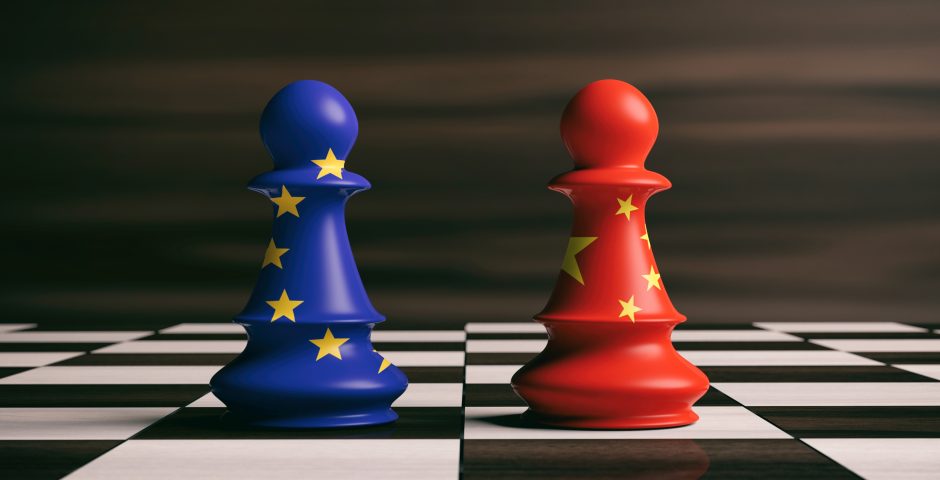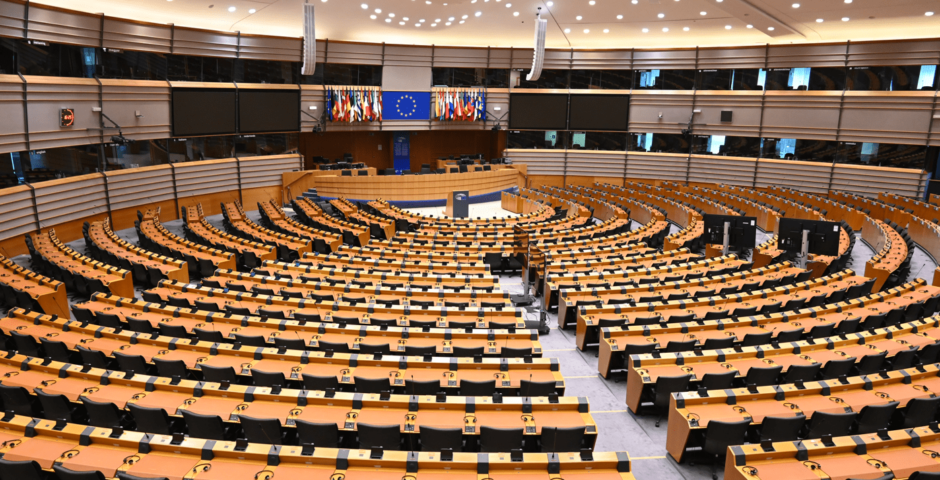The EU-China trade relationship: A story of continued imbalance? – Part I

A deep dive into Europe-China trade relations – Part I.
A systemic rival. When the EU labelled China this way in 2019, perhaps not everyone noticed. Yet, it is an event with important political consequences. After all, most people know that the relationship with China is incredibly important to the European Union. At the same time it is sometimes hard for us to imagine that a country that had the same per capita income as Bolivia twenty years ago is today the largest European export market. At the same time, Europe is also hugely important to China; the EU is China’s second-largest market after the US. That the relationship would develop this way had become clear by 2013, when both sides jointly released the strategic agenda for “EU-China cooperation in 2020”.
This put forward strategic development plans to strengthen cooperation and achieve shared benefits. Much has changed since then; there has been a growing awareness in the European Union that the potential opportunities resulting from cooperation with China present risks just as much as they present benefits. Apart from the economic opportunities that the country offers, it has become quite clear that the EU and China think very differently about the world. Where the EU believes in a free market and democratic governance, the Chinese Communist Party believes in a strong authoritarian state that can control companies when necessary. From that perspective, it is perhaps not surprising that the EU labelled China a systemic rival.
A changing world order
The perceived risks originate from the speed with which China’s economy is observed to be ascending as the next potential economic and geopolitical superpower. This means that, as Chinese ambitions to become a global leader crystallise, Western nations feel challenged in their control of the international system, a position which they have enjoyed since the end of the second world war. Many politicians are therefore aware that, as the centre of gravity of global political power shifts further and further towards Asia, the EU will have to deal with a more fragmented world order; a world order which looks to be increasingly bipolar, with the US on one side and China on the other.
This sentiment has grown in the wake of the Great Recession, the Eurozone sovereign debt crisis, and COVID-19, with the EU, increasingly becoming concerned with its relative position in the global economy. As the EU accounts for a progressively lower share of world GDP, its leaders are starting to realise that the Union’s relative decline means its future economic security in large part depends on its relationship with China. Faced with slow economic recovery, and the fall-out of the sovereign debt crisis, there is increasing interest among European politicians in rebalancing the distorted EU-China economic relationship. The belief is that European exporters should be assisted in marketing their products on the rapidly expanding Chinese consumer market, hereby remedying the EU’s trade deficit with China. This trade deficit means that the EU buys more from China than it sells. Which shows that, while many European politicians continue to see China as a promising export market and destination for investment, it is increasingly seen as an unfair competitor who unduly advantages its own companies.
These concerns stem primarily from the restrictive foreign ownership policies of Chinese companies. Indeed, it is European companies that are increasingly concerned about China’s trade barriers, currency policies and (lack of) enforcement of intellectual property rights. This has led to calls for more assertive trade policies and trade defence measures. However, the question remains: what exactly are the challenges the EU is facing in developing its relationship with China, and why do European politicians think China is an economic threat?
Why a balanced relationship matters
Reciprocity is an important concept in economic and political relations. When discussed in a political-economic sense it refers to countries treating each other’s businesses the same, regardless of which country they come from. In the context of international economics, it has mostly been associated with liberal trade policies, and it forms a central norm of the General Agreement on Tariffs and Trade (GATT), and the World Trade Organisation (WTO). Important to note is that the integration of emerging economies into global arrangements such as the WTO is based on relative reciprocity concepts that allowed “phase out” periods, allowing developing economies to gradually reduce barriers of trade as they develop, to ease their ascension.
However, reciprocity principles have related mainly to trade agreements, with their application to investment relations being much more limited. This has meant that, in the absence of international treaties, global investment openness was mainly promoted by a coalition of advanced economies, including unilateral measures to liberalise foreign capital inflows irrespective of the same treatment overseas. One example can be found in the EU Treaties, which include the principle of free movement of capital, not just for EU members but also for third countries on an explicitly non-reciprocal basis.
Open economies
This unconditional investment openness has worked well for the better part of three decades, as global cross-border investment flows have been dominated by the Organization for Economic Cooperation and Development (OECD), a group of most rich countries that – by and large – follow similar principles of reciprocal investment openness. Until recently, asymmetries in investment openness between OECD economies and China were not prioritised, as China had few legal obligations under WTO-rules to liberalize foreign investment access. Coupled with profitable returns of Western multinationals in China, despite the investment restrictions, and promises by the Chinese government to continue to open up closed sectors of the economy, reciprocity was simply not prioritised. Today, however, the situation looks very different. As growth rates have slowed, competition has grown, increasing the need for a level playing field. Meanwhile, Beijing has been reluctant to implement Foreign Direct Investment (FDI) liberalization and other market-friendly reforms, allowing Chinese companies to enjoy the open EU market while being sheltered from foreign competition at home. These protections include market entry restrictions for sectors such as energy production, transport, telecommunications, mining, broadcasting, legal and environment-related jobs.
Chinese market access restrictions
What do these restrictions look like? One way to measure restrictions is to look at the extent to which laws and regulations facilitate or prohibit foreigners from investing in a country. We know from recent research that EU member countries are among the most open economies in the world, while China remains heavily restrictive. On average, China ranks as one of the least open economies in the world, well below the EU and the OECD average. Furthermore, when looking at a more detailed breakdown of FDI restrictions by industry, we find that in virtually all industries, China is vastly more restrictive compared to EU economies. These differences are particularly pronounced in the service industry, which remains severely restricted to foreign companies.
Another important element of reciprocity is the treatment of foreign companies in China after market entry. Informal restrictions for foreign-owned business are prevalent and include rampant informal discrimination against foreign companies. Moreover, China has introduced a very broadly defined national security framework, meaning the Communist Party can practically stop any investments it deems undesirable on the grounds of national security.
There are other potential sources of unfair competition besides official restrictions as well. These consist primarily of subsidies and other non-commercial advantages arising from preferential treatment of specific, state-owned, companies. And while the role of state-owned enterprises in the Chinese economy has changed in recent decades, they still play an important role in many sectors of the Chinese economy and receive preferential access to capital and other resources. Moreover, it is not just state-owned companies that have access to preferential political treatment, but also large private multinationals. They often operate in areas deemed important national development goals or are important to governments at various levels for their tax revenue and employment opportunities. This means that many of China’s globally operating enterprises are beneficiaries of preferential treatment from local or central governments.
Going forward
Although there are many mutual interests, it is clear that the EU and China are fierce competitors. Indeed, the EU has even declared China a ‘systemic rival’. Diverging trends in matters of technological and economic development are pushing the relationship towards competition while converging trends in matters of climate change and international security are encouraging cooperation. The direction in which the relationship will develop therefore depends to a large extent on the degree to which both countries can mitigate current imbalances and concerns, first and foremost in matters of economic reciprocity. For the EU, this means developing policies that enforce investment reciprocity and reduce informal barriers and state aid concerns.
A tentative first step in this direction was taken on December 30th, when after seven years of negotiations the EU and China were able to conclude a deal in principle on investments. While details remain unclear, this deal does represent the first investment agreement between China and the EU and thus may bring more balance to the relationship. However, significant questions remain. For example, to what extent does this deal mitigate official and unofficial access restrictions? Are there any consequences for China’s human right abuses? And to what extent can both parties enforce the agreement? Until the full agreement is published, a lot of questions remain unanswered. Yet, whatever the consequences of this agreement may be, it is clear that there is still a long and difficult road ahead before the EU and China find each other. In the next article, we will therefore look at the extent to which the EU and China are approaching an understanding in the recently announced investment agreement – who knows, maybe the solution is closer than it seems?
Marnix Vermeer obtained a Master in Economics: Global challenges and macroeconomic policy from Maastricht University, and is currently pursuing a Master in International Relations in Barcelona.
Featured image: Shutterstock




